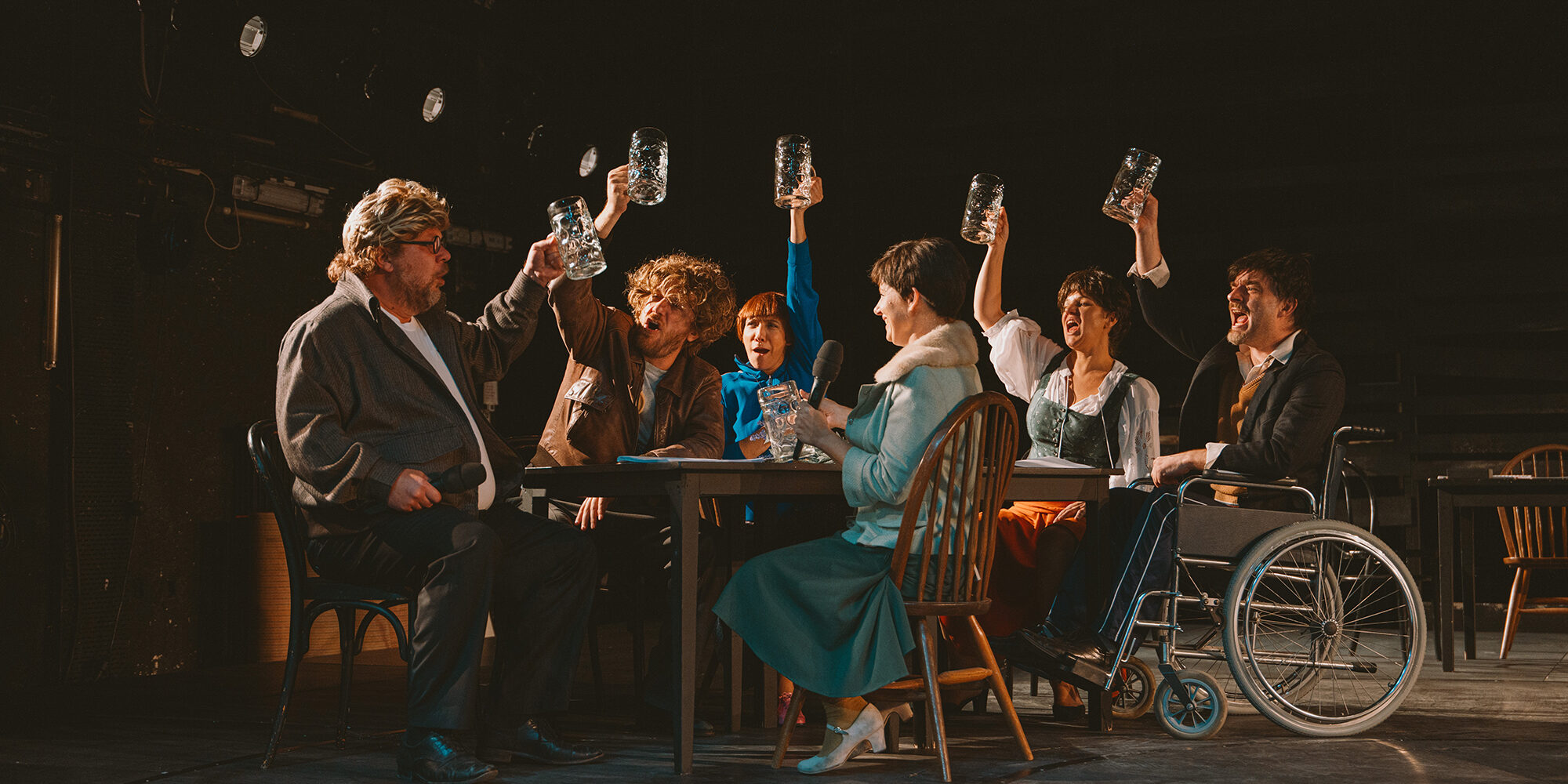City Theatre Ljubljana, premiere 19th September 2024
Nina Rajić Kranjac is not known for choosing unchallenging texts. The Slovenian director gained acclaimed for her productions of Požigi at SNG Drama Ljubljana and Tony Kushner’s Angels in America at the Mladinsko Theatre, and rightfully so. Both are extremely difficult works with themes that are not easy to address and present in an empathic, approachable manner. Once you have seen how she expresses her ideas to the audience, you can appreciate her incredible understanding of storytelling and her capacity to turn a piece of theatre into an immersive atmosphere. You see it here, from the extensive and messy introductory scenes, to the dynamic onstage action to the mesmerizing epilogue.
It makes sense therefore that Nina Rajić Kranjac and dramaturg Tibor Hrs Pandur would choose to adapt the play Kazimir and Karolina by Ödön von Horváth. Critically admired throughout his short life, and most prolific in the even shorter period between the World Wars, Von Horváth was did not cower from the Nazi regime and loudly and pretty explicitly warned people in his writings about the rise of fascism. To add to the challenge, Rajić Kranjac and Hrs Pandur decided to keep some of the cut scenes in their adaptation that did not feature in the final version of von Horváth’s play. An even more complex story without this (self)censorship, the play is set during Oktoberfest in Germany in the early 1930s, a time when racism was alive and well. The characters are drawn from diverse social backgrounds and the story follows a newly broken-up couple, the newly unemployed Kazimir and Karolina, a clerk.
My friend and I often argue from two different positions: he claims that everything is political and I claim that everything is personal. This discussion arises in many situations and usually we do not reach a meeting point. So while we could pretty convincingly argue that the break up of Kazimir and Karolina is personal – just as she claims at the beginning of the story – Kazimir is sure that, now he is unemployed, she does not want anything to do with him anymore because of his new, lower status.
The first part of the play might seem chaotic to the audience because there are many characters and connections between them that we cannot yet grasp. The MGL ensemble often thrives with work like this, when there are many actors on stage together, but it might not be the most effective way to introduce the characters clearly. But it is not a major problem. The simple yet versatile scenography by Urša Vidic, consisting of tables and chairs with a large pole in the middle of the stage, is truly helpful to the audience, allowing them to gauge the distances between characters. Placing such a large ensemble on such a small stage works well, successfully capturing the different groupings of people that we will get to know better over the course of the play, which is roughly divided into three parts.
Karolina is played by Jana Zupančič who has been a part of the MGL ensemble for more than 20 years. She brings a freshness to the role of Karolina, a character with a sometimes difficult and changeable personality, Zupančič gives a really committed performance, deploying a nasal voice, embodying Karolina through her posture and her graceful, yet sharp movements. It’s a performance that will not be forgotten any time soon in the Slovenian institutional scene. She captures the emotional disunity, sharp mind, cowardice and tragic qualities of her character perfectly. The costumes by Marina Sremac are also brilliantly simple, so elegant, but also so obviously German fashion from the 1930s; this helps Zupančič grow into the character of Karolina beautifully.
As Kazimir, Primož Pirnat has an even more difficult job. Kazimir is someone in great personal distress and he presents this well, but his naturalistic acting tendencies sometimes cross the line in a way that comes across as gruesome. Perhaps this is a facet of his character but it also somehow feels like Pirnat is not so comfortable with Rajić Kranjac’s directing style and Zupančič often outshines him.

Kazimir and Karolina – City Theatre Ljubljana. Photos: Peter Giodani
A few other ensemble member seem to struggle with a style of directing that is not often seen in their theatre, but the guest actors and younger members do not give that impression. There is fearlessness in their performances, especially those of the women, in scenes which sometimes include physical or sexual violence, and this adds credibility, especially in the second, greatest part of the production, in which Kazimir and Karolina are both struggling in their own ways. As they both indulge in chaotic behaviour, the supporting cast needs to be as precise as possible, and they succeed in this.
If the first part of the play was (intentionally) over-stuffed and more easy going, this next part provides us with the social context, which is merely implied in the introduction. Only a year before Hitler’s rise we can see the mentality of a resigned nation be mirrored in the actions of these characters – so seemingly incapable, powerless characters act superiorly to those around them. Vulnerability appears to be embedded greatly in their minds, so the only way to hide that is with the contrast of their (re)actions. Higher ranking employees look down on lower ranking employees, men are arrogant to women (in the best case scenario), mothers are mean to their children.
And in typical Rajić Kranjac fashion the third part is deconstructed, bringing each situation, each character into an uncomfortable spotlight where they have to see themselves in the least flattering, most true way. The circle around the pole in the middle part of the stage starts to play a more important role – in the second part of the play, it took on a dystopian role, conveying the excess of the entertainment industry of Oktoberfest. However, now it also implies the inescapable cycle of this (micro)society, as if escaping the pole and the surrounding circle allows the characters to change their ways, although the path is never easy. This part is also the most hauntingly beautiful, as the director works towards the play’s dark conclusion.
So, to go back to my friend’s argument, is this play personal or is it political? It of course displays both, to some degree, it shows people’s inability to escape, and the way the system works just well enough to satisfy some needs and some wants, but not too many. It warns against thoughtlessness and blind adherence to the status quo. It shows the dangers of opportunism, the historical and social context of course, and the worst of human nature. It illustrates this last one perfectly.
Credits:
Director; Nina Rajić Kranjac//Dramaturg: Tibor Hrs Pandur// Scenography: Urša Vidic//Kostumografka: Marina Sremac
For tickets and further information, visit: mgl.si
Further reading: Interview with Nina Rajić Kranjac: “Questions of identity fascinate me”
Further reading: Review of Angels in America
Živa Kadunc is a critic of contemporary performance art and a speaker on Radio Študent (Slovenia). She loves her plants.








